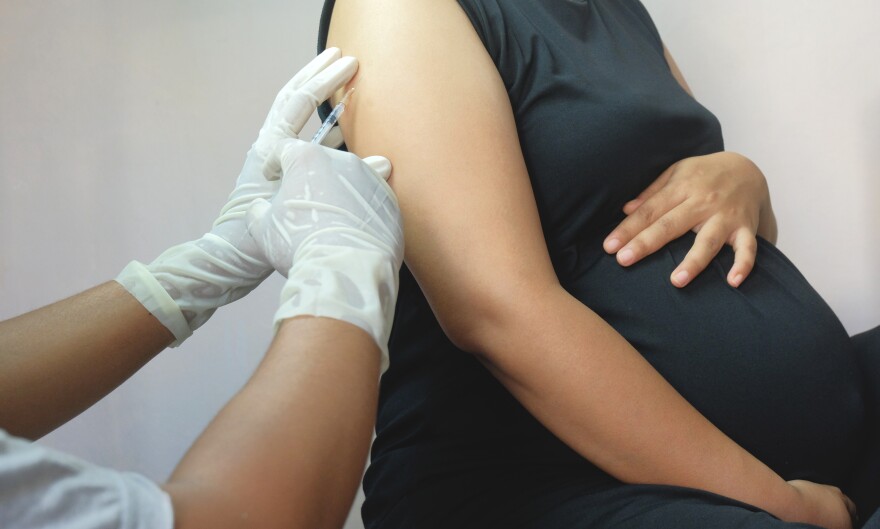Michigan health officials are trying to combat confusion about the COVID-19 vaccine, with the state health department issuing guidance Monday for pregnant women and healthy kids six months and older to continue getting the shot.
“Recently the Health and Human Service (HHS) director issued guidance to change COVID-19 vaccine recommendations for healthy children and pregnant persons,” the Michigan Department of Health and Human Services said in an advisory.
“However, the COVID-19 vaccine remains safe during pregnancy, and vaccination can protect children, women and their infants after birth. Maternal vaccination during pregnancy can reduce the risk of COVID-19-related hospitalization for infants by more than half during the first three months of life.”
It’s a direct response to U.S. Health Secretary Robert F. Kennedy, Jr.’s decision in May to remove the COVID-19 vaccine from the CDC’s recommended immunization schedules for those two groups.
“That confused a lot of people, and made people think that perhaps there was something different about the COVID vaccine,” said Dr. Natasha Bagdasarian, the state’s chief medical executive. “In fact, I heard from another physician on the west side of the state about a pregnant woman being turned away from a pharmacy when she wanted to get the COVID vaccine, because the pharmacist just wasn't sure what he could administer. And so that pregnant lady did not get her COVID vaccine that day.”
Several prominent medical societies have sued over the change to the vaccine schedule. And the mixed messages from the federal government have been especially frustrating for OBGYNs, said Dr. Kevin Ault, an OBGYN at Western Michigan University’s School of Medicine.
“It's been pretty clear to people that take care of pregnant patients that COVID is more severe in that population,” he said. “We see women getting admitted to the intensive care unit. We saw a few hundred maternal deaths, unfortunately, earlier in the pandemic. And so it's very clear to to OBGYNs and intensive care doctors and emergency room providers that COVID is severe during pregnancy.”
Getting the vaccine in pregnancy also provides critical protection for newborns, who are also particularly vulnerable to COVID, but can’t get the shot until they’re six months old, Ault said.
“They get hospitalized at the same rate that people over 65 do. And so it's really a U-shaped curve: the most vulnerable populations are the older people, and the very youngest newborns.”
COVID shots still covered by insurance, for now
So far, insurance coverage for the vaccines hasn’t changed, Bagdasarian said. That’s because most insurance plans (including Medicare, Medicaid and federal programs that cover low-income kids) are required to cover the full cost of vaccines recommended by a federal vaccine advisory panel, called the Advisory Committee on Immunization Practices (ACIP).
Kennedy recently fired all 17 members of the ACIP panel, replacing them with eight new ones.
“That group has not yet voted or made a recommendation on COVID-19 vaccines for this year,” Bagdasarian said.
If the panel stops recommending the COVID shot for those two groups, public insurers like Medicaid, or the federal Vaccines for Children program (which provides immunizations for low-income kids at no cost) may no longer be required to cover them. But private insurers can decide to cover vaccines beyond what ACIP recommends, Bagdasarian said.
“It would truly be unfortunate if we ended up in a situation where vaccines were available for those who had private insurance, but not for those who had Medicaid or even Medicare,” she said. “So we really need to make sure that there is a way for Michigan residents to get vaccines, and continue to get vaccines in the future. However, right now, nothing has changed.”
But it’s a good idea for kids and pregnant women to get the shots while they are still covered, she said. “If it gives you some peace of mind to get your immunizations now, that's not a terrible thing to do.”
Asked about potential changes to COVID-19 vaccine coverage, a spokesperson for Blue Cross Blue Shield of Michigan said the company wants “to reassure our members and customers that, at this time, there are no adjustments to our coverage for vaccines.”
And while the state’s advisory is helpful, conflicting messages from the federal government make it harder for people to figure out what vaccines are safe and if they’re available, said Emily Martin, an epidemiologist at the University of Michigan.
“We're in the middle of transitioning to this point where I think we're going to see more recommendations coming from individual medical societies and groups of physicians, but that's not someplace we're used to looking up these big, complicated [vaccine] schedules,” Martin said.
“We're used to going to the federal government for one piece of information, that's based on the data, that's been reviewed by the best experts available to review it. And so having to look all around at all these different websites to try to get the right answer is going to be a big burden on people.”







